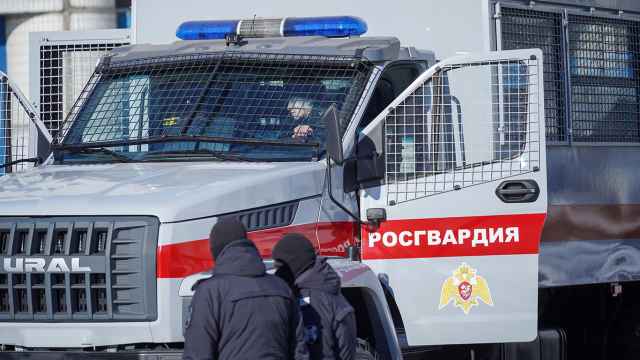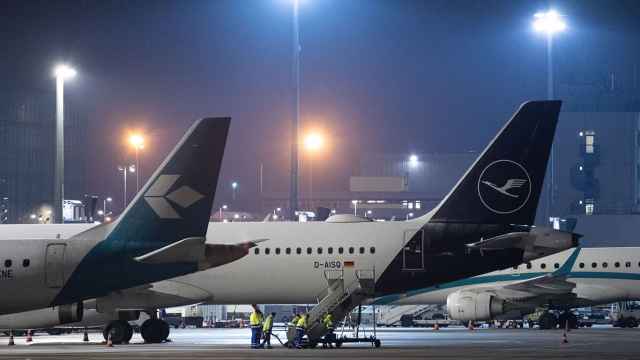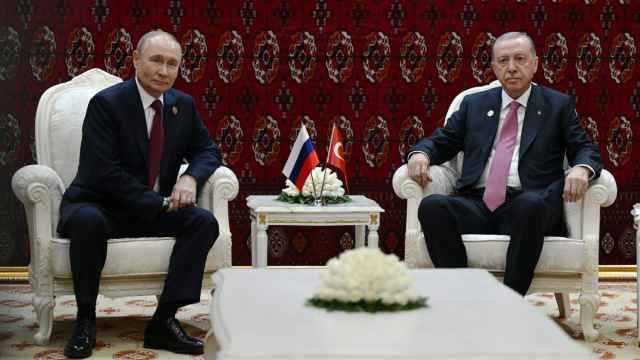An ambitious plan to make Russia one of the top 20 countries on the World Bank’s ease of doing business rating by 2018 — up from last year’s ranking of 160th — may be at risk as mid-level bureaucrats hinder execution on efforts to improve the life of entrepreneurs.
Experts of the Strategic Initiatives Agency, or SIA, an organization under the Cabinet created in August 2011 by then-Prime Minister Vladimir Putin to help drive the economy forward, have come up with 14 so-called road maps that describe specific and measurable tactics and goals to improve the business climate.
But Putin expressed frustration at the rate of execution, during a meeting with the Cabinet earlier this month. “We approved the road maps, including those aimed to develop competition, in order to implement them, not just for the sake of filing a report. What good did their approval do if they are not working?” he said.
Based on inputs from a group of more than 3,000 entrepreneurs across the country, the road maps outline plans to eliminate excessive bureaucracy, provide information on state plans and help establish clear rules of the game.
The road maps are first to be implemented in 11 trial regions. The government has approved seven road maps so far; another 5 are waiting approval and 2 more are yet to be developed.
According to the SIA, out of 120 activities in all approved road map programs scheduled to be completed during the period from July 2012 to March 2013 only 33 were actually done. Another 46 are in process, but 41 are dormant and incomplete.
The road map to support exports has seen the most progress. As of this spring 16 out of 22 activities were completed. But the road map to improve real estate registration services had 13 events scheduled for the period and none were carried out. A road map focused on improving antimonopoly policy and the competitive environment had 17 events planned with 0 completed by March of this year.
Experts of the Strategic Initiatives Agency have come up with 14 road maps intended to improve the business climate.
The problems with execution originate in the middle layer of the Russian power pyramid, between high level policy makers—who are interested not only in following Putin’s orders but also seeing improvements—and front line functionaries who have little or no ability to influence the rules themselves, experts said.
This middle level, while agreeing with the Cabinet on the idea of road maps, is sabotaging their step-by-step execution by creating never ending paper chases within and between ministries or outright ignoring requirements listed in the plans.
“We call this ‘industry-sector bureaucracy.’ Actually, that is true for all bureaucracy, excluding ministries and other government bodies which strive for economic reforms,” said Federal Anti-Monopoly Service chief Igor Artemyev.
Artemyev said the list of those who genuinely wanted to improve Russia’s standing in the world economy included the president, the Cabinet, the Economic Development Ministry, parts of the Finance Ministry, and another small portion of federal government bureaucracy, including his own agency. Entrepreneurs are strongly supportive, as well, he said, since they were the ones who developed the main principals of the road maps in the first place. Most other officials are reluctant to change.
“While a competitive marketplace is aimed at the consumer and will make his life better, competition is a hindrance to an unprofessional and corrupt bureaucracy which resists road map development because of a fear of being deprived either of status or a source of income,” said Alexander Galushka, a co-chairman of the Delovaya Rossiya business association.
Galushka cited the example that the only customs broker in Kaliningrad region is a state enterprise that is a subsidiary of the Federal Customs Service. “That is unacceptable,” he said. “We have included a measure to eliminate that in the road map aimed to improve customs administration [approved by the Cabinet] but the [Customs] Service is against it,” Galushka added.
Another example of a violation of competition is a recent decree by the Transportation Ministry obliging all truck owners to install cryptographically protected tachometers.
“And there is only one company in the country that has a license from the Federal Security Service to install these devices,” Artemyev said. “This is a $2 billion market according to expert estimates. And why do private truckers all of a sudden have to install military-standard equipment?” The Anti-Monopoly Service is planning to bring a court on this issue, he added.
While approved road maps are not being carried out, others that have been in development for some time have not received government confirmation. “The road map for the improvement of government regulation, approved by the SIA supervisory board on November 21, 2012 and the map to promote easier access of medium-sized businesses to contracts handed out by infrastructure monopolies and companies with state ownership have not been approved [by the Cabinet] to this date,” Putin said. “Why? You first argued until your throats were sore, then signed off and, afterwards, it was shelved,” he added.
“The president has revealed how much all of this costs for the economy. Every year incompletion of road map plans costs a minimum of 2.5 percentage points of GDP growth. And we are not talking about raw materials sector. This is small and medium-sized business,” Galushka said.
But hope remains. Another road map supporter is the invisible hand of the market itself.
“Development of competition is the basis for the economy. And with economic growth almost depleted and recession right around the corner, the realities will force us to make changes whether we like it or not,” Galushka said.
If the road maps will start to be realized there is hope that in a year the country will return to pre-crisis indices. In two years there might be more improvement and diversification of monopolies, Artemyev said. “We have to win or the country will be in bad shape,” he added.
The road maps for improving the business climate
| Road Map Program | Status | Target metric on World Bank rating, by 2018 |
| Support exports and foreign market access | Approved by Cabinet in June 2012 | Growth rates of exports excluding raw materials to reach 250 percent of 2011 levels |
| Improving access to energy utilities | Approved by Cabinet in June 2012 | Electricity connection simplified to 5 steps and 40 days; Russia among the 20 best states in the world in terms of energy accessibility (currently 177th) according to World Bank |
| Improving customs administration | Approved by Cabinet in June 2012 | Lowering the average cost for export-import operations per shipment to $950 — almost twice less than today with a considerable reduction of required paperwork. |
| Improvement of entrepreneurial environment in construction business | Approved by Cabinet in August 2012 | It should take no more than a year to go through all procedures needed to obtain a construction permit, initial cost of construction reduced considerably |
| Creating easier access for medium-sized businesses to contracts awarded by infrastructure monopolies and state companies | Developed by SIA, waiting for approval | The overall share of contracts awarded to medium-size businesses increases to 25 percent, compared to 10 percent today |
| Improving property registration services | Approved by Cabinet in December 2012 | Russia to be ranked 4th in the world in terms of ease of property registration convenience, up from its current 45th position |
| Improvement of the regulatory environment | Developed by SIA, waiting for approval | Overheads due to administrative burden to decrease by 40 percent compared to 2012 |
| Improvement of company registration procedures | Approved by Cabinet in March 2013 | Russia to be ranked 20th in terms of ease of company registration convenience; currently 111th |
| Increasing competition and improving antimonopoly policy | Approved by Cabinet in December 2012 | New company registrations per 1,000 people to grow to 5.2, twice more than the current number. 50 percent of entrepreneurs to confirm that competitiveness has improved, up from the current 24 percent |
| Creation of a national system of professional competencies and qualifications | Developed by SIA, waiting for approval | 160 professional standards to be developed (now 4). Russia to be ranked 20th in the World Economic Forum rating in terms of education quality (currently 71st) |
| Creation of an effective communication link between the state and entrepreneurs, including a fast response mechanism to the requests of businessmen | Developed by SIA, waiting for approval | All federal institutions to have a "red button" on their web sites — a means of direct communication between business and the government in cases of rights violation. Mandatory immediate reaction by the authorities and reporting on actions taken |
| Tax payment system upgrade | Developed by SIA, waiting for approval | To reach 40th position in World Bank Paying Taxes rating (currently 64th). Reduction of time businesses spend to prepare tax declarations |
| Investor rights protection system improvement | Under development | |
| Promotion of cheaper and more accessible bank loans | Under development |
A Message from The Moscow Times:
Dear readers,
We are facing unprecedented challenges. Russia's Prosecutor General's Office has designated The Moscow Times as an "undesirable" organization, criminalizing our work and putting our staff at risk of prosecution. This follows our earlier unjust labeling as a "foreign agent."
These actions are direct attempts to silence independent journalism in Russia. The authorities claim our work "discredits the decisions of the Russian leadership." We see things differently: we strive to provide accurate, unbiased reporting on Russia.
We, the journalists of The Moscow Times, refuse to be silenced. But to continue our work, we need your help.
Your support, no matter how small, makes a world of difference. If you can, please support us monthly starting from just $2. It's quick to set up, and every contribution makes a significant impact.
By supporting The Moscow Times, you're defending open, independent journalism in the face of repression. Thank you for standing with us.
Remind me later.





